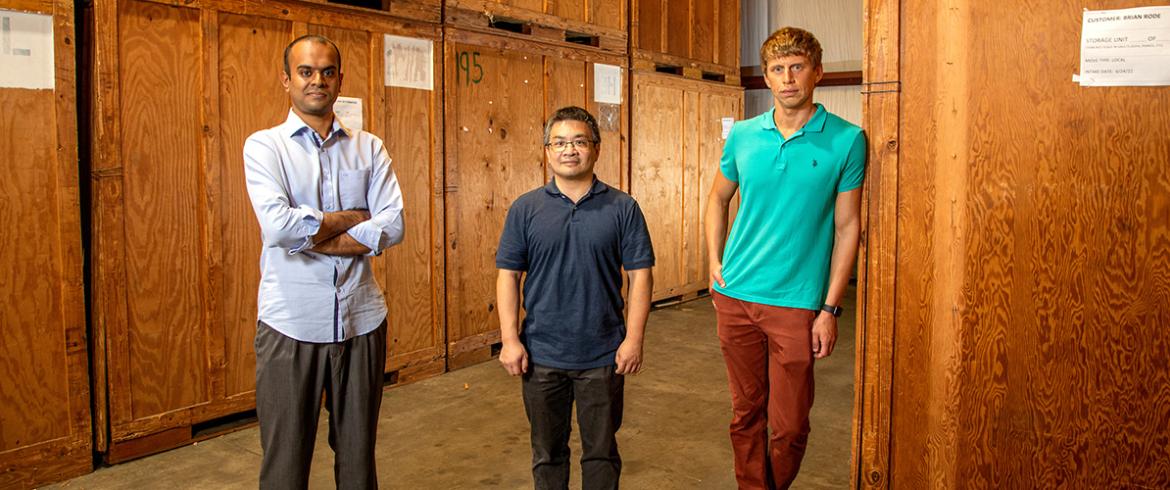
Engineering researchers (left to right) Junayed Pasha, Hui Wang and Maxim Dulebenets discovered that machine learning and artificial intelligence can determine the best routes for critical freight in the aftermath of a short or long-term disaster, easing the pressure on the supply chain. (M Wallheiser/FAMU-FSU Engineering)
Is factory-in-a-box manufacturing better than conventional manufacturing when it comes to disaster response? It comes down to algorithms, engineering researchers say…
The nature of a pandemic is to disrupt.
A factory in Shanghai recently closed because of COVID-19 lockdown restrictions. The temporary shutdown caused a product they produce—contrast media used medical imaging—to be in short supply. The closure caused shortages in the U.S. and across the globe.
However, a team of FAMU-FSU College of Engineering researchers may have the solution for disruptions in goods and services in an emergency. It may come down to specialized algorithms and artificial intelligence that combat physical routing issues and freight transport problems.
“The idea is to bring a fully functional mobile factory to people in an area directly affected by a disaster,” Pasha said. “We are specifically looking at routing issues related to getting goods and products to people in need.”
Scientists at the college have discovered that exact metaheuristic algorithms and artificial intelligence systems could improve the transportation of goods in an emergency. This finding may solve supply chain issues during a pandemic or other disaster.
The research is published in the journal of Advanced Engineering Informatics and is a multidisciplinary study involving researchers from the college and experts from Canada and China who specialize in artificial intelligence and stochastic search algorithms.
Postdoctoral researcher, Junayed Pasha, lead researcher for the study, is working with co-investigators Maxim Dulebenets, an assistant professor in civil and environmental engineering, and Hui Wang, an associate professor in industrial and manufacturing engineering. Arriana Nwodu, a graduate student in Wang’s department, is also part of the team.
There are many variables related to mobile manufacturing. One of the most complicated pertains to routing issues related to vehicle transport, a problem that requires advanced algorithms to solve. Using artificial intelligence, the research team found promising solutions for transportation and freight routing challenges that need to be solved quickly in the wake of a disaster.
“Exact optimization algorithms provide the best possible solutions for routing issues but require a lot of time to calculate,” Dulebenets said. “They may not be as efficient for large-scale vehicle routing problems with multiple objectives and in an emergency, like a hurricane or pandemic. We discovered that customized metaheuristic algorithms provide good-quality solutions in a timely manner that is essential for emergency response.”
Customized multi-objective metaheuristic algorithms outperformed exact optimization techniques, and the hybrid approach provided the best options for the location of production, according to the researchers.
The team performed a case study comparing factory-in-a-box vaccine manufacturing with conventional manufacturing. The result showed that the proposed algorithms effectively determined which manufacturing option was the most efficient in a particular situation under conflicting objectives.
By harnessing the power of computer calculations and machine learning, goods transport may no longer be the weakest link in the manufacturing chain during the next disaster.
The work was funded by the National Science Foundation, award number CMMI 1901109.
